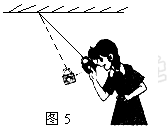问题
选择题
如图,先用绳子把一个铁锁悬挂起来,然后把铁锁拉起,松手后,铁锁向前摆动又摆回来(不计阻力),有关铁锁在摆动过程中的能量转化,下列说法正确的是( )
A.铁锁下降过程中,重力势能转化为动能
B.铁锁上升到最高点,重力势能最小
C.铁锁下降到最低点,动能最小
D.铁锁在摆动过程中机械能逐渐增大
答案
答案:A
A、铁锁下降过程中,重力势能转化为动能,故该选项符合题意;
B、铁锁上升到最高点,重力势能最大,动能为零,故该选项不符合题意;
C、铁锁下降到最低点,质量不变,高度最小,重力势能最小.质量不变,速度最大,动能最大,故该选项不符合题意;
D、铁锁在摆动过程中机械能逐渐减小,因为有小部分机械能转化成内能,故该选项不符合题意.
故选A.
